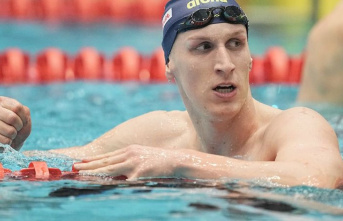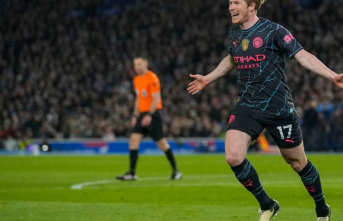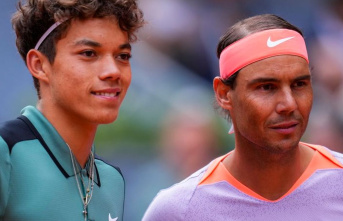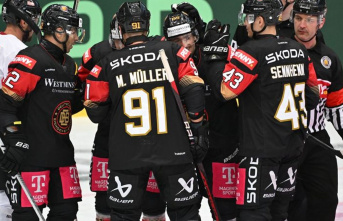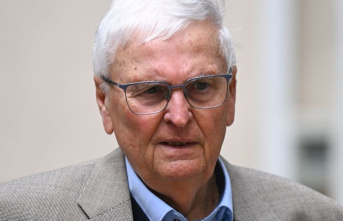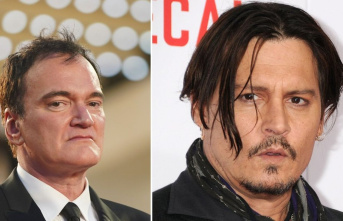Among the images that will remain of this World Cup is the scene that took place in the aisles of the stadium in Al Khour, Qatar, on Thursday night. The German national team had just been eliminated from the tournament, despite a 4-2 win over Costa Rica, and the players were down, holding each other or fighting back tears, hands over their faces, all alone. A battle painting, not painted in oil, but broken down into quivering pixels and transmitted to the arena's video screen.
Just a few minutes later, Oliver Bierhoff, Director of the German Football Association (DFB), walks through the basement of the stadium. He says into the microphones that although this is a bitter day for German football, he personally will not take any consequences: "No, I'm not thinking of that." In an interview with ARD, he would later say that he had a "very, very good feeling" about himself and his position in the association.
Bierhoff after the Costa Rica game, in this scene everything that had made him so vulnerable in the past few years condensed once again: that his words no longer match the pictures that the national team is delivering. That he has undermined the performance principle in the association, that he has an extremely mild view of himself, that he just keeps going, no matter what happens outside.
The separation after 18 years comes very late, you will know that at the association in Frankfurt. In 2018, after failing in the preliminary round of the World Cup, a cut would have been indicated, but nobody dared to do it. Hadn't the national team, led by Bierhoff and coach Joachim Löw, become world champions in 2014? Surely everything that had been right during those magical nights in Brazil couldn't suddenly be wrong. 7:1 against the Seleção in the semifinals, 1:0 against Argentina in the final, Schürrle cross, Götze goal.
Neither Bierhoff nor the DFB wanted to recognize that football is always just a snapshot and that success is fleeting. On the contrary. Winning the title in 2014 should serve as a blueprint for future tournaments. For example when choosing the quarters: Because the team in Brazil lived in seclusion on a small island in the legendary Campo Bahia, Bierhoff decided to separate the team from the hustle and bustle of the World Cup in Russia as well and guided them to a birch grove in Watuntinki, one hour away from Moscow. And in Qatar, of course, the heat of the capital could not be expected of the Germans. Bierhoff booked a wellness resort around 100 kilometers north of Doha. No other of the 32 World Cup teams lodged so far out.
The choice of quarters, it is tantamount to a sacred act in the association. As if the sporting destiny of the DFB team would be decided in the accommodation and not in the banal question of how to solve the problem of the right-back position and in the striker. Bierhoff kept turning trivial matters into the main ones, and the association that owned him went along with it.
Bierhoff has credit for winning the title in 2014, but his problem was that the world champion in him didn't want to give way. He tried to make a precious product out of the team, he put them in a display case like a diamond, although when viewed in the light of day they were just a piece of plastic.
This also contributed to the alienation that is now being lamented everywhere. Many football fans have turned away from the national team, the players feel that. "We don't get the support we would like," said Kai Havertz in Qatar. Meanwhile, Bierhoff and DFB President Bernd Neuendorf watched as the team fell into disrepute at home. Bierhoff largely let the debate about the One Love bandage run. He did not oppose the accusations that the Germans did not fight resolutely enough for diversity and human rights at the World Cup. He could have gone on the offensive, for example he could have attacked Robert Habeck, who said to Lanz, "I would wear the bandage now", but who himself did not mention the subject of human rights at all when he was talking about a gas deal negotiated.
Bierhoff should have raised his voice in this sometimes absurd debate, he should have protected his team, which failed twice in Qatar: They neither met the high moral standards in Germany as a fighter for good, nor did the results on the pitch agree.
Bierhoff, actually a skilful negotiator and pulling the strings, ultimately lacked a feeling for the big issues surrounding the national team. With some delay, he himself recognized that a new start was needed in terms of personnel, especially with a view to the European Championships at home, which will kick off in a year and a half.
The fact that there was a lot of criticism of Bierhoff during the hours of his farewell reveals a structural problem in the association: Bierhoff was a one-man show, politically certainly an advantage for himself, and at the same time an indictment of the DFB, the largest with seven million members national sports federation in the world.
If only a successor for Bierhoff were to be sought now, such a job advertisement would be misleading. A new Bierhoff, a new strong man or a new strong woman would not help the association. The DFB needs a modern organizational chart in the top management, it has to distribute power and competences among several people, there needs to be contradiction and friction, also internally. The time of heroic football is irrevocably over for the DFB since this World Cup.


